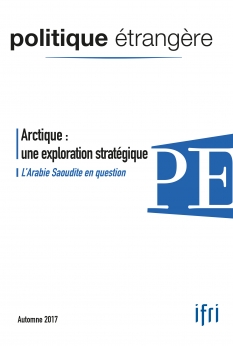
POLITIQUE ÉTRANGÈRE N° 3/2017
Pour acheter ce numéro, contactez-nous
Recevez les numéros de l'année en cours et accédez à l'intégralité des articles en ligne.
Avec sa présence à Bahreïn, son intervention au Yémen, ses relations avec l’Iran, ou l’isolement du Qatar, l’Arabie Saoudite semble s’affirmer comme un État perturbateur, diplomatique et religieux, au Moyen-Orient. La diplomatie religieuse du wahhabisme joue un rôle central dans la stratégie de Riyad. Tout comme une stratégie de l’information, véritable dispositif d’influence, qui vise à orienter en sa faveur les opinions et les décideurs des grandes démocraties.
With its intervention in Yemen, its relations with Iran, and the isolation of Qatar, Saudi Arabia seems to affirm itself as a diplomatic and religious disruptive state in the Middle East. The religious diplomacy of Wahhabism plays a central role in Riyadh’s strategy. It is an information tool and a true lever of influence that aims at turning the opinions of the decision-makers of major democracies in the country’s favour.